Energy-Saving HVAC Tips for Summer Cooling
Posted on by WestAIR Heating & Cooling

So far, June has given Minnesotans multiple occasions to fire up the A/C. With the dog days of summer yet to come, plenty more hot and humid days await. But don’t sweat it – WestAIR is here to help! We put together these energy-saving HVAC tips to help minimize your utility bills this cooling season.
Prevent Issues Later with Professional Service Now
Having an HVAC technician inspect, service, and clean your system now helps ensure peak performance and prevent costly repairs down the road. If you haven’t already, contact your local HVAC professional about the following services.
- Annual preventative maintenance: Give your system a tune-up before the season to ensure optimal performance and efficiency. During service, the technician can also catch small issues before they become expensive repairs and help you decide if it’s time for an upgrade.
- Duct cleaning: Ductwork should be cleaned annually as dirt, pollen, hair, dust, and other particles collect inside and reduce indoor air quality over time. They can also clog up the system if left long enough, decreasing its efficiency and increasing energy bills.
Optimize A/C Performance with Tips Around the Home
You don’t have to shut down your HVAC system and suffer through the heat to cut costs. Instead, follow these simple tips and get the most out of your A/C this summer.
- Keep vents clean and clear. Blocking vents with rugs, furniture, and other items decreases efficiency. Make sure cool air can circulate freely, and vacuum vents regularly to clean away dust, dirt, and other debris.
- Maintain a clean air filter. Filters prevent debris from getting into your HVAC unit and naturally become dirty or clogged, which adds stress onto the system. To avoid issues, change (or clean, if re-usable) your filter monthly.
- Seal the home. Don’t let cool air escape or heat enter whenever possible. Caulk any cracks or seams around the home; lock windows shut to ensure a tight seal; draw blinds and curtains to prevent any natural heating from sunlight.
- Be smart about electronics. Unplug chargers, small appliances, and other electronics when they’re not in use. Also, avoid placing heat-generating devices like lamps and TVs near thermostats – the heat can make it seem like the room is hotter than it really is and trick the thermostat into working harder to cool the home.
- Grill outside or plan cold meals. Cooking in the oven or on the stove produces heat and can raise the temperature in your kitchen by up to 10 degrees. Take advantage of the summer weather and fire up the grill, or plan some cold meals like salads and sandwiches.
- Use ceiling fans. Set ceiling fans to spin counterclockwise so they blow air straight down. This will keep cool air low and create a wind chill effect, allowing you to turn the thermostat up a few degrees.
- Consider installing a programmable thermostat. While proper thermostat management can help keep bills low, constantly changing the thermostat can impact your HVAC system’s efficiency and health. Programmable thermostats let you pre-set custom temperature and humidity levels for multiple days instead of monitoring it manually.
Lower Utility Bills with Strategic Water Use
According to the U.S. Department of Energy (DOE), 18 percent of your home’s energy consumption comes from water heating. Try these water use strategies to help cut utility costs throughout the summer months.
- Wash clothes with cold or warm water. According to the U.S. Environmental Protection Agency (EPA), water heating accounts for 90 percent of the energy used by your washing machine. Avoid washing with hot water whenever possible. Also, line-dry laundry outside to save more energy and reduce indoor humidity.
- Take cold(er) showers. Hot showers require more energy, and the steam they produce increases humidity. Take colder, shorter showers to lower costs and help maintain indoor air quality.
- Water the lawn and garden at dawn or dusk. Water usage tends to increase in the summer, especially outdoors due to lawn, garden, and landscape watering. Do these tasks in the early morning or at dusk to prevent the water from quickly evaporating in the summer heat. This will help cut costs and keep your yard and garden healthy.
With July and August still ahead, we know the cooling season is far from over here in Minnesota. Use these energy-saving HVAC tips to minimize utility costs while keeping your home cool and cozy this summer. And for all of your heating and cooling needs, rely on the residential HVAC experts at WestAIR for thorough, high-quality service.
Contact us today to schedule service and learn more.
This entry was posted in AC,Air Conditioning,Cooling,Duct Cleaning,Energy Savings,Tips and tagged air conditioning, Air filters, Cooling Mistakes, Cooling Tips, Duct cleaning, Energy efficiency, Energy efficient, Energy savings, Energy-Saving HVAC Tips, Energy-saving tips, Family Health, Home Cooling, Homeowner Education, Homeowner Tips, HVAC Education, HVAC Maintenance, HVAC Mistakes, HVAC Safety, HVAC tips, Indoor air quality, Preventative Maintenance, Summer Cooling, Summer HVAC Tips
Common Summer HVAC Mistakes to Avoid
Posted on by WestAIR Heating & Cooling

Summer weather is finally upon us, and we know that 2020 won’t be like every other year. Air conditioners play a vital role here in Minnesota and keeping them running properly will be even more important this time around. To help, we gathered a list of common summer HVAC mistakes to avoid as you keep your home feeling cool and cozy.
Neglecting Regular Maintenance
Regular HVAC maintenance helps prevent inconvenient breakdowns that leave you without cool, comfortable air and with an expensive repair to get it back. Avoid these mistakes to help keep your system running smoothly all season long.
- Not scheduling preventative maintenance. Don’t wait until you need an HVAC professional to call one. Have a regular preventative maintenance check early on to promote optimal performance throughout the summer.
- Running a system with dirty ducts. Dirt, dust, pet hair, and other harmful particles settle into your ductwork over time and get blown into the air you and your family breathe. Left long enough, they can also clog the system, forcing it to work harder and hiking up your utility bills as a result. Annual duct cleaning is vital to the health and efficiency of your HVAC system, as well as indoor air quality.
- Not keeping a clean filter. Just like ductwork, dirty or clogged air filters cause added stress on your HVAC system and decreased air quality. Plan to change your air filter (or clean if re-usable) monthly.
Having an Oversized System
Bigger isn’t always better when it comes to HVAC. Proper air conditioning will circulate cool air and remove humidity simultaneously and evenly – if the unit is too big, it will cool the home quickly without removing enough moisture from the air. As a result, you won’t feel comfortably cool and may turn the thermostat even lower, working the system harder and increasing energy use.
If your A/C isn’t cooling the home how you feel it should, consult your local HVAC experts about possibly upgrading to a right-sized system.
Closing Unused Air Vents
Some homeowners worry about cooling rooms that aren’t used on a daily basis. However, as mentioned above, properly sized systems are designed to evenly distribute cool air to the entire home. While it may seem logical to close unused vents to focus on cooling high-traffic areas, closing unused air vents decreases system efficiency and increases its workload.
Improper Thermostat Management
Altering the thermostat setting can be a touchy subject in the home, and doing so can impact the efficiency and health of your system. Remember to avoid these common mistakes.
- Don’t crank the thermostat. You may be tempted to turn the temp extra-low to cool the home quickly, but this method actually decreases efficiency and adds stress onto the system. Be patient. Set the temperature to a comfortable level and let it run at its optimal rate.
- Don’t pay to keep an empty house cool. No need to use extra energy to keep the house comfy if no one’s home. Turn the thermostat up when you’re gone for work or out of town, and turn it back down when you return.
- But don’t turn the system off. Turning the system completely off forces it to work harder to cool the home when it’s fired back up. Unless you’re leaving for an extended trip, keep the A/C running at a higher temperature.
Consider Installing a Programmable Thermostat
Programmable thermostats let you customize and set temperature and humidity settings for multiple days, eliminating the need to manually monitor them throughout the day. Contact us to learn more about optimizing your summertime cooling performance and schedule with a new smart thermostat.
Crowding/Obstructing the Outdoor Unit
Outdoor units need to easily draw in air to operate efficiently.
Clear any clutter and obstructions within two to three feet of the unit and be
sure to keep it clean of grass clippings, dirt, and other debris throughout the
summer.
Not Properly Sealing the Home
It’s a pretty simple concept: Keep cool air from escaping and heat from entering the home. Be mindful of these simple mistakes that impact your home’s cooling comfort and costs.
- Neglecting leaks and drafts. Inspect windows, doors, and exterior walls and seal or caulk any small cracks or gaps that could let cool air out and warm air in.
- Leaving windows unlocked and uncovered. Even shut windows can have small leaks, so lock them to ensure a tight seal. During the day, use curtains and shades to block direct rays of sunlight from heating your home.
Not Managing Indoor Humidity
Humidity plays a crucial role when it comes to home comfort and air quality. While HVAC systems pull moisture from the air, there are many things you can do to help reduce humidity in your home, such as taking cold(er) showers, using exhaust fans, and installing a dehumidifier to work in conjunction with your air conditioner.
Minnesota summers provide amazing opportunities to get outside and enjoy nature’s beauty, but we all know the importance of having a cool, comfortable home to relax in. Keep these common summer HVAC mistakes in mind to help avoid any issues with your system this cooling season.
As your residential HVAC experts, WestAIR is proud to reliably serve all your heating and cooling needs. Contact us today to schedule service and learn more.
This entry was posted in AC,Air Conditioning,Cooling,Duct Cleaning,Energy Savings,Indoor Air Quality,Repairs,Tips and tagged air conditioning, Air filters, Cooling Mistakes, Cooling Tips, Duct cleaning, Family Health, Family Safety, Home Cooling, Home Safety, Homeowner Education, Homeowner Tips, HVAC Education, HVAC Maintenance, HVAC Mistakes, HVAC Safety, HVAC tips, Indoor air quality, Preventative Maintenance, Summer Cooling, UV Light, WestAIR Heating & Cooling
Tips for Controlling Spring Allergies at Home
Posted on by WestAIR Heating & Cooling
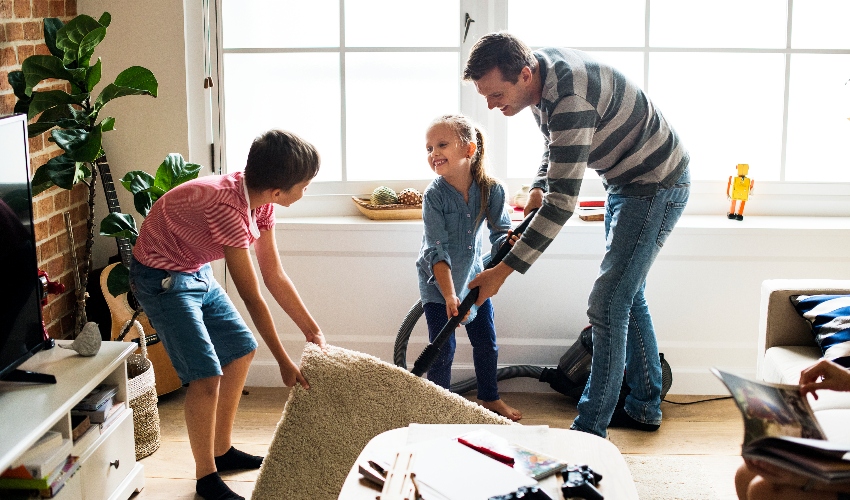
Seeing warmer weather and longer days is bittersweet for allergy sufferers. Spring may be in the air, but so are pesky allergens. As we spend more time in our homes during the COVID-19 pandemic, indoor air quality becomes more important than ever. Use these helpful tips for controlling spring allergies at home to stay healthy and comfortable.
Change Shoes and Clothing After Being Outdoors
Controlling allergies begins with limiting exposure to allergens. Limit your time outdoors whenever possible. If you do venture out, don’t wear the same clothing and shoes around your home. Dirt, dust, pollen, and other irritants can cling to you and your wardrobe. Avoid tracking them around by changing as soon as you return home.
Dust, Vacuum, and Mop Regularly
Dust and allergens will settle on the surfaces of your home. Try to clean them at least weekly, and more often if you are leaving windows and doors open.
Have Your Ductwork Cleaned
Air ducts transport fresh air between your home and HVAC system, and over time will collect dust, pollen, and other airborne particles that travel through them. Having them cleaned annually is vital to indoor air quality. Schedule a professional duct cleaning service to help ensure you’re ready for the season.
Maintain a Clean Air Filter
The air filter blocks airborne irritants from getting into your system. However, it becomes dirty and less effective over time. If left long enough, the filter can also become clogged and make your system work harder, causing higher bills and faster wear and tear. Change (or clean it if re-usable) your air filter monthly to keep the system running properly.
Install an Air Cleaner
The name says it all. An air cleaner uses a filter to trap up to 97 percent of airborne bacteria, mold, dander, and other pollen-sized irritants. It can also eliminate viruses, kill germs, and neutralize odors and fumes.
Invest in Ultraviolet (UV) Light Air Purification
Breaking through an organism’s cell wall to destroy its DNA, UV light rays prevent that organism from reproducing and causing illness. UV technology has been around for over 100 years, and many homeowners today utilize it as a highly effective way to kill harmful bacteria, mold, and viruses in the home.
These systems conveniently work in conjunction with your current HVAC system. WestAIR is an authorized dealer of BreatheCLEAN UV air purification systems. Contact us to learn more or to schedule your UV light system installation.
Consider an Air Exchanger
Letting fresh air into the home can be beneficial, but it brings allergens along with it. An air exchanger solves this by exhausting stale indoor air and excess humidity while also delivering a continuous flow of filtered outdoor air inside. Installing a programmable thermostat will help you maintain indoor comfort without constantly managing temperature. And again, remember to keep your filter clean!
Controlling spring allergies at home comes down to limiting exposure to allergens. It sounds simple, but don’t be fooled into thinking the home is a completely irritant-free safe space. While we may be spending less time outdoors than usual this spring, use these tips to maintain indoor air quality and keep allergy symptoms at bay.
WestAIR’s HVAC experts are here for all your heating and cooling needs. As we continue helping our customers prepare their homes for the spring and summer during this time, our team is taking extra precautions to protect the health and safety of themselves and everyone they service. We prioritize your comfort and satisfaction in all that we do. Contact us today to schedule service and learn more.
This entry was posted in AC,Air Conditioning,Cooling,Duct Cleaning,Health Tips,Indoor Air Quality,Spring,Tips and tagged Air cleaner, air conditioning, Air exchanger, Air filters, Family Health, Family Safety, Heating, Home Heating, Home Safety, Homeowner Education, Homeowner Tips, HVAC Safety, HVAC tips, Importance of Indoor Air Quality, Indoor air quality, Spring Allergies, Spring Cleaning, Spring Heating and Cooling, UV Light
HVAC Tips for Spring Cleaning
Posted on by WestAIR Heating & Cooling

We can finally see that spring is on its way! With the weather warming up, it’s time to start preparing the home for the cooling season. Will yours be ready? To help out, we put together a list of HVAC tips for spring cleaning.
Change Air Filter (or Clean if Re-Usable)
A dirty or clogged air filter makes your system work harder, leading to higher bills and increased wear and tear. It also negatively affects indoor air quality. Change your air filter (or clean it if re-usable), and plan to do so monthly to keep the system working properly.
Clean Floor Registers and Return Air Vents
If dust gets into your HVAC system, it can negatively impact both energy efficiency and your home’s air quality. Use a vacuum to clean your floor registers and return air vents. You can get a deeper clean by removing the vent, brushing the individual grill spaces with a rag and butter knife, and then rinsing with warm soapy water.
Dust and Mop Around the Home
Though you should do these chores regularly throughout the year, dusting and mopping are especially important during spring. With windows and doors being left open more often, airborne particles like dust, dirt, and allergens accumulate on your surfaces and eventually make their way into your HVAC system.
Have Your Ductwork Cleaned
Air ducts supply your HVAC system with fresh air, but they can quickly become dirty from all the dust, pollen, and other harmful particles floating in the air. Keeping them clean helps prevent these harmful pollutants from accumulating in your ductwork and impacting the health of your HVAC system and air quality. Spring cleaning is the perfect time for a professional duct cleaning service, which you should do annually.
Clean Bathroom Exhaust Fan(s)
Clean and properly functioning, bathroom exhaust fans help with odor and moisture control, which helps prevent mold and mildew. Be sure the power is off, wash it with soapy water, and clean dirt and debris off the fan blades with a toothbrush.
Clean and Clear Debris from Outdoor A/C Unit
If your outdoor unit doesn’t get enough air or has dirt-covered coils, it could overheat. Turn off the power and clear away plants, weeds, leaves, branches, etc., and then rinse the condenser coils with a garden hose.
Check/Change Batteries in Smoke/Carbon Monoxide Detectors
Smoke and carbon monoxide detectors are a crucial line of defense against two common household dangers. Check the batteries and replace them if necessary. You should also dust or vacuum them to optimize performance.
Schedule Preventative Maintenance
Don’t get caught with a failing A/C or expensive repair bill down the road. Schedule a preventative maintenance service with your local HVAC contractor to ensure your system is running smoothly and ready for the cooling season.
During Minnesota winters, at times it feels like spring will never come. But when the days get longer and the temps rise, we know it’s time to start getting ready. Use these HVAC tips for spring cleaning to help make sure your home is ready for a safe, comfortable, and happy cooling season.
The HVAC professionals at WestAIR offer experience and expertise to cover all your heating and cooling needs. Contact us today to schedule service and learn more.
This entry was posted in AC,Air Conditioning,Cooling,Duct Cleaning,Health Tips,Indoor Air Quality,Spring,Tips and tagged air conditioning, Duct cleaning, Duct cleaning service, Family Health, Family Safety, Heating, Home Heating, Home Safety, Homeowner Education, Homeowner Tips, HVAC Safety, HVAC tips, Importance of Indoor Air Quality, Indoor air quality, Professional duct cleaning, Spring Cleaning, Spring Heating and Cooling
Importance of Indoor Air Quality
Posted on by WestAIR Heating & Cooling
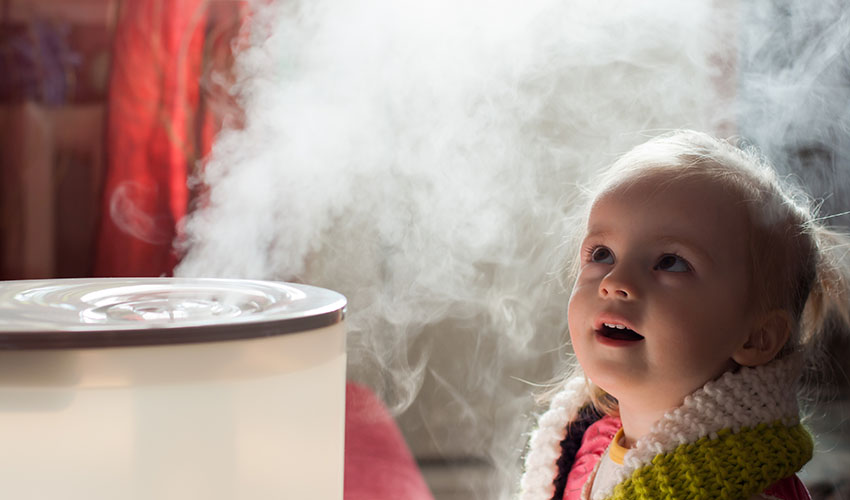
When we think about pollutants, many of us jump to an image of factories pumping smoke and toxins into the air. But what about on a smaller, more personal scale? Most of us spend more time in our own home than anywhere else, yet fail to consider the potential harm we face there. Let’s look at the importance of indoor air quality for family health.
Why Indoor Air Quality Matters
According to the EPA, the concentrations of pollutants in indoors are often two to three times what they typically are outdoors. Additionally, the EPA says that on average, Americans spend about 90 percent of their time indoors, with people who are more susceptible to pollution’s adverse effects (including children, older adults, and those with cardiovascular or respiratory disease) spending even more.
Causes/Sources
When it comes to indoor pollutants, most people are aware of secondhand smoke, radon, and carbon monoxide. Other threats to indoor air quality include:
- Combustion sources like wood, coal, and gas heating and cooking appliances
- Cleaning supplies releasing different chemicals into the air
- Building materials like insulation and pressed wood
- HVAC systems, especially if improperly maintained
- Pet hair, dander, and other allergens
- Inadequate ventilation
- Dust mites and pests
- Mold and bacteria
Outdoor air pollutants can also make their way inside the home through open doors and windows, ventilation systems, and cracks and seams. Chimney smoke can reenter and pollute the air, and volatile chemicals can sometimes enter via the water supply when cooking or showering. By simply entering the home, people inadvertently bring the soil and dust particles attached to their clothing along with them, as well as any pollutants attached to those particles.
Effects
The effects of indoor air pollutants vary both by person and based on length of exposure. Some immediate, short-term effects include:
- Irritation of the eyes, nose, and throat
- Coughing and sneezing
- Headaches, dizziness, and fatigue
- Upper respiratory congestion
- Triggered or worsening asthma symptoms, including asthma attacks
Long-term and more severe health effects include:
- Respiratory disease, heart disease, and cancer
- Nausea and vomiting
- Fever and chills
- Myalgia (muscle pain)
- Nose bleeds
- Difficult or painful breathing
If you experience any of these symptoms, contact your healthcare professional or dial 9-1-1 in case of emergency. Consult your local HVAC professional about improving your home’s air quality.
Tips
Whether we’re escaping hot and humid summer days or the bitter cold of winter, Minnesota residents spend plenty of time indoors year-round. Maintaining clean indoor air is crucial, and here are a few basic tips to get you started:
- Let in fresh air: Open windows and doors when possible and consider purchasing an air exchanger to help replace stale indoor air with during the winter.
- Clean regularly: Vacuum carpets and rugs one to two times each week and dust hard surfaces weekly.
- Wash bedding weekly and consider using dust mite-proof covers on pillows, mattresses, and box springs.
- Have your ductwork cleaned and change your filter (or clean if re-usable) monthly.
- Invest in an air cleaner to efficiently trap and remove airborne pollutants.
- Declutter your living space to avoid trapping and holding dust.
WestAIR Heating & Cooling understands the importance of indoor air quality, and we want to help keep your family safe and healthy. We offer professional duct cleaning as well as sale and service of air exchangers, air cleaners, whole house humidifiers, and replacement filters.Contact us to learn more and schedule service today.
This entry was posted in Duct Cleaning,Health Tips,Indoor Air Quality,Tips and tagged Effects of Indoor Air Pollutants, Effects of Indoor Air Quality, Effects of Poor Indoor Air Quality, Family Health, Family Safety, Heating, Heating System, Home Heating, Home Safety, Homeowner Education, Homeowner Tips, HVAC Safety, Importance of Indoor Air Quality, Indoor air, Indoor Air Pollutants, Indoor air quality, Indoor air quality solutions, Indoor Air Quality Tips, Winter
Indoor Air Quality Solutions
Posted on by WestAIR Heating & Cooling

Ever looked at a ray of light streaming through your windows and noticed floating dust particles? The sunlight can reveal a lot about a room’s air quality. While it may be tempting to open up the windows and doors for a quick fix, we’re in the thick of ragweed season, so it probably won’t do you any favors. The EPA recommends upgrading your HVAC filter or using an air cleaner to reduce harmful airborne particles. Read our blog to learn why and discover some more indoor air quality solutions.
New filters
Your HVAC filter traps microorganisms, animal fur, hair, lint, dander, mold, pollen, dirt, and more so they don’t accumulate in your system or irritate your lungs. Check your filter once a month to see if it needs replacing. A clogged air filter can cause your HVAC equipment to overheat, short cycle, or even break down. At the very least, changing a dirty filter could lower your energy bills because your system won’t have to work twice as hard just to obtain adequate airflow.
Air cleaner
An air cleaner uses a filter to trap particles like bacteria, mold, ragweed, pet dander, and dust mites. It can even eliminate viruses, kill germs, neutralize fumes, and remove odors. Those with allergies, asthma, or sensitivity to chemicals can benefit from an air cleaner, which can remove up to 97 percent of pollen-sized particles.
Air exchanger
Every time you cook, shower, clean, and breathe, you release pollutants into the air. Airtight buildings are more energy efficient, but they need to somehow circulate air to maintain a healthy environment. Without adequate ventilation, old air will sit in enclosed spaces and accumulate dust, bacteria, mold, and other harmful particles.
An air exchanger provides refreshed, filtered air to reduce these allergens. Air exchangers use two fans, one to take stale air out, and the other to pull in fresh air, run it through a filter, and disperse it through the ductwork.
Dehumidifier
Humidity makes a room seem hotter than it is and increases the likelihood of mold and mildew growth. Drier air feels cooler. A dehumidifier can increase your comfort and allow you to raise the temperature a few degrees to save on cooling expenses. You can use a portable unit or install a whole house dehumidifier that works in conjunction with your HVAC system.
Dehumidifiers pull moist air over a cooling coil that condenses the moisture vapor into droplets. Moisture along the coils drips into a collection pan or directly down a drain.
Duct cleaning
In most HVAC systems, all the conditioned air passes through ductwork to supply vents in each room, and back through return registers to be conditioned again. Particles floating in the air could become trapped in the many channels and crevices behind your walls. If the ductwork is dirty, your indoor air will be, too, no matter what air cleaning accessories you install. During air duct cleaning, your technician will use powerful vacuums and brushes to dislodge debris and allow proper airflow.
Bonus tip
Plants clean the air of carbon dioxide and can remove cancer-causing formaldehyde, benzene, and other toxins. If you are looking for an inexpensive way to purify your indoor air, bring in some potted vegetation. They can improve your physical health as well as your mental well-being by reducing stress, building memory retention, and increasing concentration, which in turn boosts productivity.
At WestAIR, we care about you and your family’s health and comfort. We offer air quality solutions to rid your home or business of harmful pollutants and provide fresh oxygen, day in, and day out.
Contact us to learn more.
This entry was posted in Duct Cleaning,Indoor Air Quality,Tips and tagged Air circulation, Air cleaner, Air filters, Allergies, Asthma, Clean HVAC ducts, Comfortable, Cooling, Energy efficiency, Energy savings, Humidity, HVAC, HVAC tips, Indoor air quality, Indoor air quality solutions
Spring HVAC Checklist
Posted on by WestAIR Heating & Cooling

Some of the most pressing concerns for Minnesota homeowners are humidity levels, poor air quality, and increased utility bills. In the spring, those HVAC issues are a hot topic as the warm weather approaches. Follow our spring HVAC checklist to inspect and prepare your equipment for summer.
- Turn off power to your outdoor unit from the electrical disconnect and clear away plants, weeds, fallen leaves, and branches. Use a garden hose to gently rinse off the condenser coils. If the unit doesn’t get enough air or the coils are covered in dirt, it could overheat.
- Change your filter, and plan to do so monthly when your furnace and air conditioning are in use. Filters keep dust and dirt from entering your system, extend equipment life, reduce energy costs, and improve indoor air quality.
- Clean return air vents and floor registers in your home with a vacuum. If dust gets in the system, it could compromise energy efficiency and air quality. For a deeper clean, remove the vent, wrap a butter knife in a rag to scrub the individual grill spaces, and rinse with warm water and soap.
- Check the batteries in your carbon monoxide detector(s) and replace if needed so you know it is working properly to keep your family safe.
- Caulk windows and doors to minimize air leakage so the cool air your system produces isn’t wasted. According to the U.S. Department of Energy, the best time to apply caulk is in low humidity when the temperature is about 45 degrees, making spring the ideal time for this simple maintenance.
- Dust and mop so dirt, allergens, and other airborne particles don’t end up in your ductwork. Schedule duct cleaning if you haven’t done so in a while or you suspect your ductwork is dirty.
- Clean windows, blinds, and curtains so you can let the sunlight into your home and enjoy a clear view of the outdoors without producing a cloud of dust each time you open them.
- Dust ceiling fan blades and reverse their direction to rotate counterclockwise so they’ll blow air straight down and produce a wind-chill effect. Most fan models have a small switch on the motor housing.
- Power up your air conditioning to see if everything is working properly. You should visually inspect the unit for any leaking chemical fluids and check your home for burning, gas, or musty odors.
- Schedule service with your HVAC contractor for a thorough inspection. They’ll clean, lubricate, and troubleshoot your equipment so it will run smoothly and efficiently.
Midwest summers can be particularly hot and sticky, and homeowners can spend up to 250 dollars a month running their air conditioner. WestAIR Heating & Cooling is here to help you save money in every season with a variety of specials on our services. We also provide indoor air quality solutions so you can minimize spring allergies and live comfortably. If you are having trouble with your HVAC system, contact us for repair and replacement services.
This entry was posted in Air Conditioning,Duct Cleaning,Indoor Air Quality,Repairs,Spring and tagged A/C, air conditioning, Allergies, Asthma, Clean HVAC ducts, Cooling, Duct cleaning, Dust, Energy savings, Hot weather, Humidity, HVAC, HVAC checklist, Indoor air, Indoor air quality, Indoor air quality solutions, Indoor humidity
The Importance of Air Duct Cleaning
Posted on by WestAIR Heating & Cooling
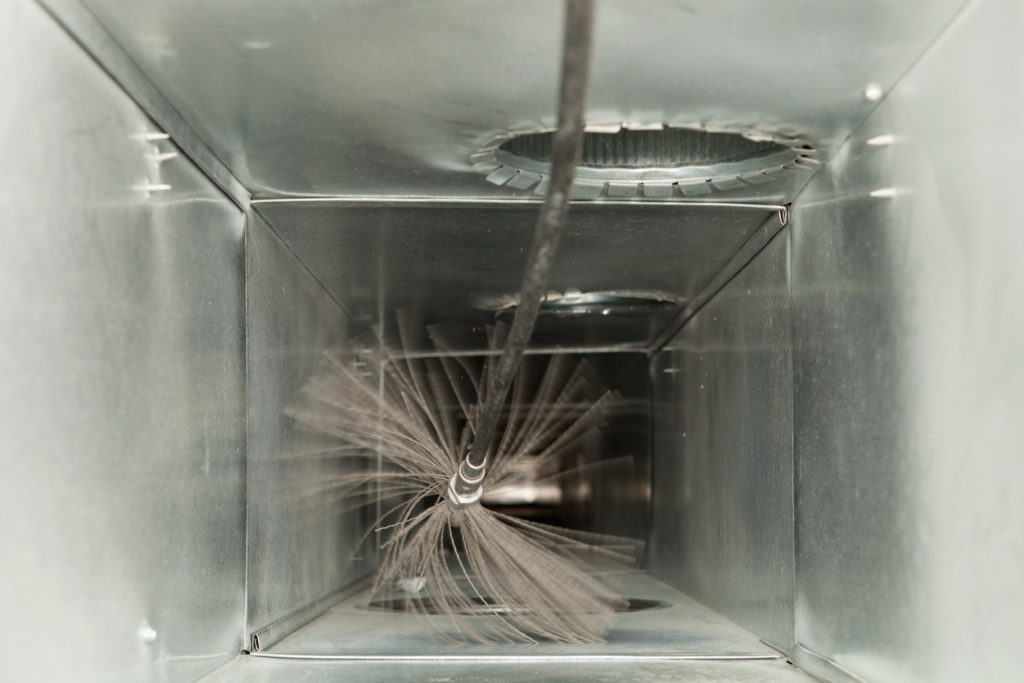
Air ducts are like the lungs of your home, supplying your HVAC system with a steady stream of fresh air. With so much dust, pollen, mold, and other harmful particles floating in your indoor air, your ductwork can quickly become a home for dirt. Professional air duct cleaning can keep harmful pollutants from circulating and settling in your ductwork.
What is air duct cleaning?
Your technician will inspect the system to make sure there’s no asbestos-containing materials, as those materials require specialized procedures to disturb or remove. They may cut out small holes in the ductwork to get inside. Using vacuum equipment and bristled brushes, your technician will dislodge and draw out particles and dust. Then, they’ll seal and re-insulate holes. Make sure to research and hire a qualified contractor with the resources and expertise to clean your air ducts safely. If not properly cleaned, you could face problems like damaged HVAC components or holes that have not been tightly sealed, compromising an airtight system.
How often should I schedule air duct cleaning?
According to the National Air Duct Cleaners Association (NADCA), air pollutants like dander, dust, and chemicals are re-circulated in your home five to seven times a day, on average. You should have your air ducts cleaned every three to five years, or more, depending on your lifestyle. In a home with pets, cigarette or cigar smoke, water damage, or renovation projects underway, more pollutants may be circulating. Schedule duct cleaning service if
- You’re unsure whether previous homeowners cleaned the air ducts in your current residence.
- There’s mold growth on visible parts inside your ducts or other heating system components.
- Your ducts are infested with vermin like rodents or insects.
- Your supply registers spew out dust when your HVAC system turns on.
- Your family is experiencing unusual or unexplained respiratory problems (allergies, asthma, sore throat, etc.).
How do I keep my ducts clean on a daily basis?
Follow these tips from the pros:
- To prevent dirt from getting into your system, use a high efficiency, manufacturer-recommended air filter for your HVAC system and change it regularly, especially if they clog frequently. When installing, make sure that air cannot get through gaps around the filter holder/frame.
- When you schedule your regular HVAC maintenance service, ask your provider to clean cooling coils and drain pans.
- If you are having renovations or construction work done, seal off supply and return registers throughout your home and don’t turn on your HVAC system until you’ve cleaned up the dust.
- Vacuum and dust frequently.
WestAIR Heating & Cooling provides duct cleaning service with our innovative Rotobrush equipment. Using a powerful, specialized vacuum and cleaning devices, we draw air through your duct system to dislodge any debris that may be stuck on interior surfaces. We also offer air exchangers, air cleaners, whole house humidifiers, replacement filters, and more to improve indoor air quality. Contact us to learn more.
This entry was posted in Duct Cleaning,Indoor Air Quality and tagged Clean HVAC ducts, Duct cleaning, Duct cleaning service, Indoor air, Indoor air quality, Professional duct cleaning
How Indoor Air Quality Impacts Your Family’s Health
Posted on by WestAIR Heating & Cooling
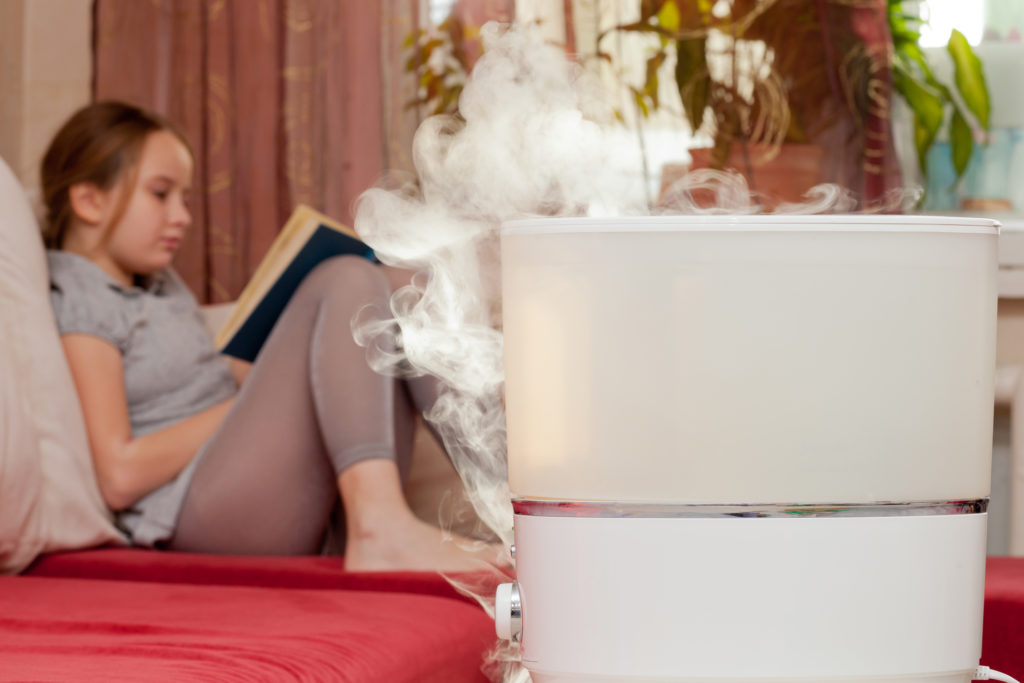 Humans inhale 11,000 to 15,000 liters of air per day. Most families spend more time in their home than anywhere else. Without proper ventilation, your indoor air could hold gases, chemicals, or other pollutants that can cause headaches, eye and skin irritation, allergies, asthma attacks, fatigue, and even cancer or long-term health complications. What’s even scarier? Ninety-eight percent of all airborne particles are below one micron (1/25,000 inch) in size and invisible to the naked eye.
Humans inhale 11,000 to 15,000 liters of air per day. Most families spend more time in their home than anywhere else. Without proper ventilation, your indoor air could hold gases, chemicals, or other pollutants that can cause headaches, eye and skin irritation, allergies, asthma attacks, fatigue, and even cancer or long-term health complications. What’s even scarier? Ninety-eight percent of all airborne particles are below one micron (1/25,000 inch) in size and invisible to the naked eye.
Imagine a toxic soup of pollutants constantly re-circulated throughout your home, through your respiratory system, and into your bloodstream.
The most obvious pollutants are secondhand smoke, radon, and carbon monoxide, but harmful airborne particles could come from any of the following:
- Gas, oil, kerosene, or wood stoves and fireplaces.
- Building materials like insulation, carpet, cabinetry, and pressed wood products.
- Personal care products and household chemicals like cleaning solutions, glues, and pastes.
- Pesticides, pollen, pet dander, hair, or other fibers.
- Dust mites, molds, and bacteria.
Children are more susceptible to all these things because their bodies are still developing. They breathe more air and eat more food in relation to their body weight than adults do. Properly maintained indoor air quality is especially important for people with asthma, allergies, chemical sensitivities, respiratory diseases, suppressed immune systems, or contact lenses. Here are some basic tips to make sure your home has clean, fresh air free of pollutants:
- Invest in a whole house humidifier or a smaller unit. The Mayo Clinic recommends you keep your home between 30 and 50 percent humidity.
- Make sure all vents are clear of obstructions and working properly.
- Have your ducts cleaned and change your furnace filter regularly (check it once a month).
- Buy a houseplant like a peace lily, dracaena, or garden mum to act as an air purifier.
- Use an exhaust fan when cooking, running the dishwasher, or bathing.
- Make sure gas stoves are well ventilated.
- Avoid smoking.
- Use craft supplies in well-vented areas.
- Minimize clutter.
- Remove carpeting if possible.
- Don’t wear outdoor shoes around the house.
- Keep the trash covered.
- Test your home for radon and use carbon monoxide detectors.
- Fix water leaks.
- Dust surfaces.
- Vacuum frequently, and open windows when you do.
- Wash bedding weekly.
- Keep a lid on scented candles when not in use.
WestAIR Heating & Cooling wants to help you live a healthier life with safe indoor air quality. We offer air exchangers, air cleaners, whole house humidifiers, replacement filters, and more to equip your HVAC system against contaminants. We also provide duct cleaning service so you can rest assured your air has clean, unobstructed passage throughout your home. Contact us to learn more.
This entry was posted in Duct Cleaning,Health Tips,Indoor Air Quality and tagged Air cleaner, Air filters, Duct cleaning, Dust, Filters, High efficiency electronic air cleaner, HVAC, Indoor air, Indoor air quality
Air Duct Cleaning & Maintenance
Posted on by WestAIR Heating & Cooling
Clean air ducts help keep dirt, dust mites, and mold out of the air of your home. Turning on a contaminated or clogged heating and cooling system can cycle these potentially harmful particles into the air you breathe and decrease indoor air quality. How do you know if you need an air duct cleaning service?
Check with your local HVAC technician to find any visible mold or excessive dust and debris inside your ducts, or if there has been a recent infestation of rodents or insects.
Keep your ducts clean by practicing proper home habits.
• Change your furnace and air conditioner filters regularly.
• Check to make sure you use the right air filters that fit your equipment.
• Make sure your HVAC equipment is efficient and regularly maintained.
• Dust and vacuum your home regularly. Vacuuming can increase the amount of dust in the air, so it’s worth upgrading to a high efficiency (HEPA) vacuum cleaner.
• Seal off supply and return registers during home renovation or construction.
• Maintain your humidifier to prevent mold inside the home.
• Repair leaks and water damage promptly.
• Make sure ducts are sealed properly and insulated in attics and crawl spaces.
• Invest in an Aprilaire Air Cleaner to reduce the amount of dust circulating around your home. Air cleaners trap 98 percent of visible dust and irritating particles, and 97 percent of airborne pollen. Attached to your furnace, the filters remove matter through the blower fan and return clean air back into the rooms of your home.
Air duct cleaning is not an annual service, but might be needed after some time, especially if you have pets, smoke, sensitive allergies, respiratory needs, or live in a humid environment.
At WestAir Heating & Cooling, we use a specialized Rotobrush cleaning system to clean air duct systems. This “source removal” cleaning method utilizes powerful vacuums and brushes to dislodge any debris that stick to the surface.
If you think you might need your ducts cleaned or worry about your indoor air quality, contact us for more information.
This entry was posted in Duct Cleaning,Health Tips,Indoor Air Quality and tagged Air cleaner, Air cleaning, Air ducts, Air filter, Air filtration, Air quality, Allergies, Aprilaire, Clogged ducts, Cooling, Dander, Debris, Dehumidifier, Dirt, Dirty ducts, Duct cleaning, Duct maintenance, Ducts, Dust, Heating, Humidifier, HVAC, Mold, Moldy ducts, Particles, Pets, Pollen, Rotobrush, Vacuum
Subscribe to Our Blog
With RSS feeds, you don't have to visit our site everyday to keep up to date. Simply subscribe to our blog via RSS or Email and our posts will come to you!
Search Blog Posts
Categories
Archives
- April 2024 (1)
- February 2024 (1)
- January 2024 (1)
- February 2023 (1)
- January 2023 (1)
- December 2022 (1)
- November 2022 (1)
- October 2022 (1)
- September 2022 (1)
- August 2022 (1)
- July 2022 (1)
- June 2022 (1)
- May 2022 (1)
- April 2022 (1)
- March 2022 (1)
- February 2022 (2)
- December 2021 (1)
- November 2021 (1)
- October 2021 (1)
- September 2021 (1)
- August 2021 (1)
- July 2021 (1)
- June 2021 (1)
- May 2021 (1)
- April 2021 (1)
- March 2021 (2)
- January 2021 (1)
- December 2020 (1)
- November 2020 (1)
- October 2020 (1)
- September 2020 (1)
- August 2020 (1)
- July 2020 (1)
- June 2020 (1)
- May 2020 (1)
- April 2020 (1)
- March 2020 (1)
- February 2020 (2)
- November 2019 (1)
- August 2019 (2)
- June 2019 (1)
- May 2019 (1)
- April 2019 (1)
- March 2019 (1)
- February 2019 (1)
- January 2019 (1)
- December 2018 (1)
- November 2018 (1)
- October 2018 (1)
- September 2018 (1)
- August 2018 (2)
- July 2018 (1)
- May 2018 (1)
- April 2018 (1)
- March 2018 (1)
- February 2018 (1)
- January 2018 (1)
- December 2017 (3)
- November 2017 (2)
- October 2017 (2)
- September 2017 (2)
- August 2017 (1)
- July 2017 (2)
- June 2017 (3)
- May 2017 (2)
- January 2017 (4)
- November 2016 (1)
- September 2016 (3)
- July 2016 (2)
- June 2016 (2)
- May 2016 (4)
- April 2016 (1)
- March 2016 (2)
- February 2016 (2)
- January 2016 (1)
- August 2015 (1)
- July 2015 (1)
- June 2015 (3)
- May 2015 (1)
- July 2014 (2)
- June 2014 (1)
- April 2014 (1)
- March 2014 (1)
- February 2014 (2)
- October 2013 (1)
- May 2013 (1)
- March 2013 (1)
- February 2013 (1)
- August 2012 (1)
- July 2012 (2)
- June 2012 (2)
- May 2012 (2)
- March 2012 (1)
- February 2012 (1)
- December 2011 (1)
- November 2011 (1)
- October 2011 (1)
- September 2011 (1)
- August 2011 (1)
- June 2011 (1)
- May 2011 (1)
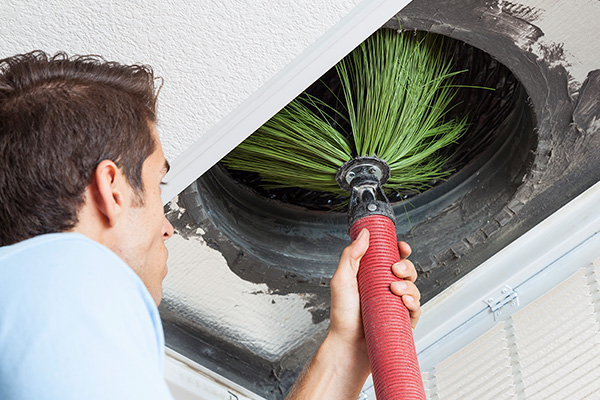
 Subscribe
Subscribe Subscribe
Subscribe